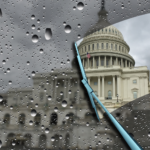Can Congress Forbid States from Cutting Taxes?
Under our Constitution, states are essentially free to set their own policies without federal interference, including by crafting tax policies that work best for them. But Congress trampled on this right when it passed the “American Rescue Plan Act,” which blocks states that accept federal COVID relief funds under the legislation from cutting taxes—triggering lawsuits from Ohio and multiple other states. Today the Goldwater Institute filed a brief with the U.S. Supreme Court arguing that Ohio—one of multiple states to challenge this unconstitutional mandate—should be free to sue Congress for forbidding the state from cutting taxes.
One of the benefits of our federalist system is that it enables states to design their own laws to meet their own needs, and to “compete” to provide the best overall place to live and do business. That’s why the Constitution gives Congress only limited authority, leaving most things at the state level. Or, in the words of James Madison, the federal government’s powers are “few and defined,” while the states’ powers are “numerous and indefinite…. The powers reserved to the several States will extend to all the objects which, in the ordinary course of affairs, concern the lives, liberties, and properties of the people, and the internal order, improvement, and prosperity of the State.”
Probably the most important of those policies relates to taxes. States are free to decide how to set their own tax policies to meet their own financial needs. Some states choose wisely—some don’t—and Americans can “vote with their feet” by choosing the states that offer them the best package of taxes and benefits.
But when Congress adopted the American Rescue Plan Act, it took a dangerous step over the constitutional line. That’s because the act included a provision that forbids states that accept federal funding from passing laws that reduce their tax revenue. It’s not Congress’s place to block states from cutting taxes, but the act deprives states of this crucial power if they accept funds.
Several states—including Texas, Arizona, and Ohio—have sued to challenge the constitutionality of this prohibition. But although some courts have allowed these cases to proceed, the Ohio lawsuit was thrown out in a decision that said the state had no “standing” to sue—that is, it had not suffered the kind of harm that would allow it to ask a court to step in. Now the Goldwater Institute has filed a friend-of-the-court brief urging the U.S. Supreme Court to override that decision and allow Ohio’s lawsuit to proceed.
At the center of the lawsuit is the Constitution’s Spending Clause. According to the U.S. Supreme Court, Congress has very little power to boss states around—but when spending money under this clause, it can ask states to do certain things in exchange for those funds. In a 1987 case called South Dakota v. Dole, the court said Congress could require the state to change its drinking age in exchange for receiving federal funds to fix up highways. After all, if the state doesn’t want to comply with the conditions Congress requires, the state can say no, and not take the money.
That theory seems logical, until you remember two things. First, federal funding is often an extremely large part of every state’s budget, meaning that states often are not in a position to say no. In the Obamacare case of 2010, the Supreme Court acknowledged that federal Medicaid funding sometimes makes up such a huge portion of a state’s revenue that Congress is able to demand whatever concessions it wants from states. The justices concluded that there must be some limit to Congress’s power to demand things in exchange for money—although they never said what the limit is. The second problem with the South Dakota v. Dole theory is that even if a state does say no, it’s still forced to send its tax dollars to Washington, D.C., to be redistributed to the states that say yes.
That means states should at least be free to sue Congress when it takes their tax dollars and tells them that they must comply with certain conditions if they want any of it back. As we point out in our brief, the current rules about “standing” have ignored that principle for too long—and one result is that Congress continually expands its powers over the states, distorting our federalist system and squelching the “competition” between states that our Constitution is supposed to preserve.
States should be encouraged to reduce taxes whenever possible, and to make financially responsible choices that are most likely to foster a healthy economy. Taking away their power to do so—by unconstitutional fiat, no less—is both unwise and illegal.
You can read our brief here, and read more about the case here.
Timothy Sandefur is the Vice President for Legal Affairs at the Goldwater Institute.
Get Connected to Goldwater
Sign up for the latest news, event updates, and more.

Donate Now
Help all Americans live freer, happier lives. Join the Goldwater Institute as we defend and strengthen freedom in all 50 states.
Donate NowSince 1988, the Goldwater Institute has been in the liberty business — defending and promoting freedom, and achieving more than 400 victories in all 50 states. Donate today to help support our mission.

We Protect Your Rights
Our attorneys defend individual rights and protect those who cannot protect themselves.
Need Help? Submit a case.





